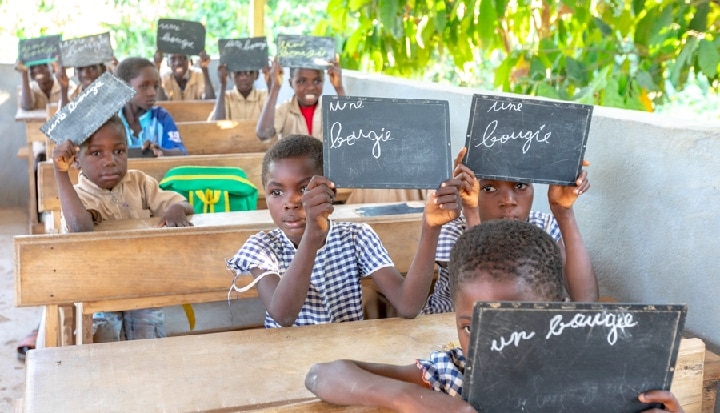The theme of this year’s UN International Day of Education, “to invest in people, prioritize education,” resonates with us at Cargill as it aligns with the work we are doing in cocoa growing communities. In these communities, improving access to quality education helps keep children away from child labor and grants them the opportunity to explore their talents. It also enables adults skill up, helping families prosper, and, ultimately, building thriving, sustainable communities.
How do we know? Because we do it every day.
Cargill’s purpose is to nourish the world in a safe, responsible and sustainability way. One of the ways we deliver on that commitment in our cocoa supply chain is through the Cargill Cocoa Promise, our sustainability program for the sector. To date, we have reached more than a quarter of a million cocoa farmers in West Africa, Asia and Latin America. With our partners, we run more than 100 programs in these communities. And we can confidently say: Quality education is one of the main levers for progress.
Since we launched the Cocoa Promise in 2012, we’ve become more convinced than ever that business can be a prominent driver for social change. We’ve evolved from tackling the symptoms of issues affecting the cocoa industry to addressing their root causes. And we’ve gained a better understanding of how all these issues are connected.
Education is one example to illustrate that principle. When you broaden access to schooling, you reduce child labor, but you also set students up for economic success later in life and create better opportunities for everyone in the community.
Seemingly small details can make a big difference. Take, for instance, the initiative we developed with the International Cocoa Initiative (ICI), in Côte d’Ivoire, to provide families with birth certificates for their children. With a birth certificate, a child has access to an elementary school education, which opens the path to vocational technical training and higher education later on.
Children who are in school are at reduced risk of child labor. But they also have a supervised place to go every day, which gives parents or other adults in their households the opportunity to make extra money for their families or get technical training to set up their own businesses.
Bottom line: educating one child can lead to significantly better opportunities for the people around them. From our own perspective, what started as a drive to tackle child labor grew into a program that helps uplift whole communities.
To date, we’ve helped obtain birth certificates for 45,000 children. Partnering with a variety of NGOs and local government partners, we’ve also helped build six schools in Ghana, eight in Côte d’Ivoire, and three in Cameroon in the last year. And we’re training school management committees to improve enrollment, attendance, teaching quality and supporting distribution of nutritional supplements.
To increase our impact further, we’ve partnered with the Government of Côte d’Ivoire, specialized NGOs and fifteen other chocolate companies to form the Child Learning and Education Facility (CLEF). The goal of that collective effort is to provide quality education for 5 million children and influence 10 million parents by 2030.
But education doesn’t stop there. While we’re helping children get a stronger start in life, we’re also helping adults gain a firmer footing. Case in point: our Coop Academy program, which offers business training for cocoa cooperative leaders.
Since 2013, the Coop Academy has trained more than 700 participants from 70 cooperatives in Côte d’Ivoire and Cameroon. Another 700 are expected to graduate this year. The results are transformative. In many cases, cooperatives end up raising their profit margins and producing sustainable cocoa that global food makers value.
Meanwhile, we’re empowering women by helping them improve their financial literacy. Working with our partner CARE, we’re supporting them in setting up Village Savings and Loans Associations (VSLAs), which give them access to affordable credit to set up their own business.
So far, we’ve established 686 VSLAs in West Africa, helping more than 11,000 women start or expand small businesses and become income generators for their families and communities.
In the end, these are all interlocking elements of a strategy that aims to build stronger, more resilient cocoa-growing communities. Ideally, the children going to elementary school with their birth certificates in hand today will be tomorrow’s community leaders of the future.
What’s certain is that their drive and creativity will be needed, and this will give the young people the opportunity to live up to their full potential. That’s why we believe so strongly in the power of quality education.










